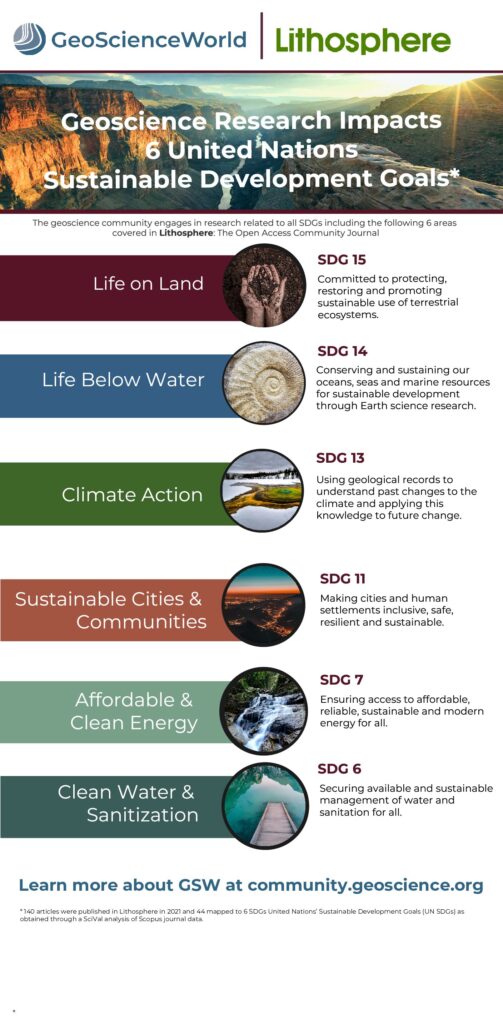How geologists focus on Earth Science while reaching key Sustainable Development Goals
At GeoScienceWorld, we have been thinking about how the research we publish might be able to impact the United Nations’ 17 Sustainable Development Goals (SDGs).
The SDGs present a clear path to a future where we have a healthier planet and more equitable communities. They have become an important touchstone in many sectors where organizations are trying to be intentional in their efforts to prioritize environmental consciousness.
As you can see in our infographic below, at least 6 of the SDGs should be of particular interest to anyone working in geology and related fields. These are all goals where Earth Science research stands to make an especially big impact, whether it is informing ocean conservation efforts or helping to make our cities more sustainably run and better able to withstand rising seas.
In his paper “Geology and the Sustainable Development Goals,” Joel C. Gill of the British Geological Survey suggests some practical ways that geology research could contribute to sustainable development, such as:
- Providing access to clean water by identifying groundwater resources and preventing contamination
- Improving food security by using local rock and mineral materials to boost soil fertility
- Reducing disaster risk by studying the science underlying the generation of landslides, earthquakes and volcanic eruptions
- Supporting infrastructure by doing geo-morphological mapping for road construction or characterizing rock masses prior to dam construction
These are only a few examples, but it’s easy to see how critical geological knowledge is to our basic health, safety and well-being, especially in a world where climate change is rapidly altering our way of life. Knowledge of the earth is foundational to understanding the soil that crops grow in, the sources of water, and natural structures both on and under the surface.
Earth Science research actively relates to the following SDGs:
- No. 6 Clean Water & Sanitation
- No. 14 Life Below Water
- No. 15 Life on Land
Those aren’t the only ones. Earth Science research also greatly contributes to two of the most-discussed SDGs:
- No. 7 Clean Energy
- No. 13 Climate Action
To tackle climate change, geologists can examine the geological record for clues that might suggest how the climate will continue to change going forward. This will inform steps taken towards climate action in the future. For the development of clean energy, Earth Science researchers can identify the potential for hydrocarbon or geothermal energy. Their knowledge of the elements is also important in the growing areas of wind and solar energy, where certain minerals and ores play a crucial role.
We hope researchers working in all the Earth Sciences will turn to the GeoScienceWorld community to access peer-reviewed research and search tools. If you are interested in diving further into issues around climate, ecology, clean energy, and sustainability, our OA journal, Lithosphere, covers research in all areas of earth, planetary, and environmental sciences and includes a number of recently published articles that map to the UN SDGs.

